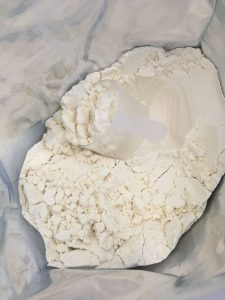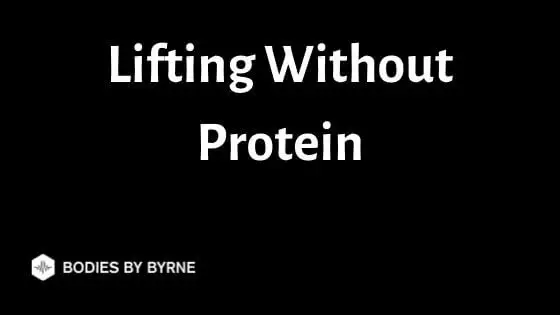When you first start lifting weights and working out then you will hear a few tips that are repeated over and over again. Train for progressive overload, make sure you get 8 hours of sleep, squat and deadlift often, carbs are good because they help you build muscle, carbs are bad because they make you gain fat…
The list is actually quite extensive to the point that you can’t follow one piece of advice without it contradicting another piece of advice and one of the most controversial topics of all is protein consumption.
Many feel that protein is the holy grail for building muscle and there is some strong evidence in favor of this mentality, protein after all is essentially the building blocks of our muscles.
Lifting without protein? Just to maintain muscle mass it is advised that you consume a minimum of 0.8g per 1kg of body weight. If you lift weights without adequate protein intake to support protein synthesis then you will not only struggle to build new muscle tissue but could actually be at risk of losing muscle mass.
This is why people following a vegetarian/vegan diet are very sensitive to protein requirements as it’s much more difficult to consume a large amount of protein from a plant based diet. Animal produce (meat, fish, poultry and dairy) all tend to provide significantly more protein per gram.
It’s not just those on a plant based diet either that are concerned about consuming enough protein when lifting and that is why we are going to look into what your protein requirements are in general and then more importantly, when lifting.
Humans are pretty good at survival and adaptability, we have been doing it successfully for long enough now to know this to be true. Therefore I can say that protein consumption is essential when lifting however it is essential for optimum results.
This website has the sole intention of helping people improve their body composition and therefore I’m not too concerned with whether you can lift without protein and get away with it but rather why you should be looking for the optimal protein intake to build muscle and then consuming that.
Table of Contents
What Happens If You Lift Without Protein

Lifting weights and resistance training in general (bodyweight exercises count as well) creates a response within your muscles that do two things, trigger muscle protein synthesis (MPS) which is the building of new muscle tissue and muscle protein breakdown (MPB) which as the name suggests is when your body breaks down proteins.
The human body is in a constant state of breaking down and regenerating/repairing so you should never see MPB as a bad thing because it’s a natural occurrence. What is important however is the length of time that you stay in this catabolic state.
MPS is an anabolic state mean muscle building, MPB is catabolic meaning the breakdown of proteins and muscle tissue. The key to muscle growth is to make sure you are in an anabolic state for a longer period of time than a catabolic state.
This is known as your net protein balance and improving the time spent in protein synthesis while reducing the time spent in protein breakdown will lead to an increase in skeletal muscle mass. Source [1][2]
Consuming protein and having a supply of protein and amino acids in the body kickstarts and helps to maintain a state of protein synthesis and lifting weights also kickstarts this process.
It’s important to note however that lifting causes microscopic tears to the muscles (which is how they grow back larger and stronger with nutrition and rest) which is also a catabolic process.
Therefore without getting too technical as the studies are linked above, you need to give your body an adequate supply of protein when lifting in order to put your body into an anabolic and muscle building state.
Sure, you can lift without protein, carbs and fats provide the energy source for muscular contractions but the real question is will you see results if from lifting without sufficient protein intake?
Can You Build Muscle Without Protein
Hopefully my tone is making it easy to see where I am going with this, protein is the building block of a muscle, it triggers protein synthesis which is a muscle building state and also helps to prevent your body from breaking down muscle tissue for protein (this happens, it’s not only the muscles that require protein within our bodies).
With that being said I’d comfortably say that you would really struggle to build a noticeable amount of muscle mass if you are not consuming enough protein, especially enough to support you lifting.
I’m sure there are people with good genetics who don’t need a large quantity of protein in order to build or maintain muscle mass but for the vast majority of people, to build muscle and ultimately a physique you need to get your protein requirements in order.
It’s top of the macro requirement list when I design a nutrition and training plan and the best indicator of this is that natural bodybuilders (those without performance enhancing substances) will always recommend a minimum protein intake.
Of course people will have different opinions over how much protein you should consume but the one constant is that everyone recommends a minimum amount.
How Much Protein Do You Need to Preserve Muscle Mass
I mentioned this earlier but studies show that in order to maintain your current level of muscle mass for anyone below the age of 50 (muscle breakdown occurs at a faster rate as we age so a higher amount is recommended for 50+ and particularly 65+ year olds) you should consume 0.8g per 1kg of body weight which is roughly 0.35g per 1lb of body weight.
For a resistance trained individual however the recommendation is closer to 0.8g per 1lb of body weight so actually more than double that of the general public.
This is a general recommendation for the general public and is provided by the Academy of Nutrition and Dietetics.
This also is aimed more at someone just working out a few times a week to stay fit and healthy, if you are engaging in heavy weightlifting and looking to build muscle over time then your requirements will be even higher.
The reason the recommendations and numbers differ is because a 220lb male with 10% body fat would require significantly more protein then a 220lb male with 25% body fat and this is because the first person has much more lean muscle mass that they need to maintain.
That’s why these numbers are a basic guideline. I personally prefer the recommendation of 1g per 1lb body weight because this then reduces the amount of calories you can consume from carbs and fats which are often the cause for most people being overweight.
In all my guides on bulking or cutting you will find that I recommended a minimum protein intake when it comes to body composition but a better physique comes down to having less body fat and more muscle mass so it’s important to cover both of these bases.
How Much Protein Do You Need a Day to Build Muscle
You can see that the recommendations for protein requirements vary quite a bit but for the general public to maintain muscle mass, as touched on those that are serious about changing their physique and body composition place significantly more demand and stress on their bodies so the recommendations for building muscle therefore need to be adjusted.
There are two main schools of thought to this, the first is that during a bulk when calories are high, energy levels are high and there are surplus nutrients within the digestive system and bloodstream for utilization that protein intake doesn’t need to be as high.
0.8g – 1g per 1lb body weight is often a recommendation you will see for someone in a muscle building phase. Some will push this a bit higher but it’s more for the psychological safety net of ensuring that they are definitely consuming enough protein (some will go as high as 2g per 1lb body weight).
If I’m honest, the 1g per 1lb body weight is a pretty universal recommendation for those looking to build muscle and it ensures that you will have enough protein in your system to facilitate muscle growth.
More protein past this point has been shown to have no positive effects and in fact Menno Henselmans has compiled multiple studies to show that 0.8g of protein per 1lb body weight is optimal for muscle growth.
The only time this recommendation changes is when someone goes on a cutting (fat loss) dieting phase, here where calories are lower whilst also having the same demands on the muscular system the recommendation can go as high as 1.5g per 1lb of body weight but this is purely to maintain muscle mass.
Lifting Without Protein
As you can see from all of the studies and sources I’ve listed so far the topic is always following a recommended protein consumption not only for resistance trained individuals but also for the population in general.
I think this fact alone is a key indicator that lifting without protein is not an advised route to take. I’m particularly sensitive to this subject as those with a higher protein diet tend to have a more favourable body composition.
There are some direct results from this (facilitating muscle protein synthesis) as well as some indirect results (increased satiety from protein reduces over consumption of total calories) and therefore I feel most people are better off increasing protein rather than considering whether or not they can get away without it.
When it comes to training however the evidence seems to clearly point to a set protein requirement just to maintain muscle mass and this of course gets adjusted for those pursuing muscle growth. This alone should be enough to show you that lifting without protein shouldn’t really be a consideration, especially if you are looking for optimal results.
What Next
If you are looking to make changes to your physique by either losing body fat, building muscle or looking to maintain a lean physique then sign up to my weekly newsletter below. Each week I send out actionable tips to help you lose that extra 1lb of fat or build that extra 0.5lb of muscle mass on a weekly basis.
If you sign up now you’ll also receive my 28 day body recomp program completely Free. This ebook will be sent straight to your inbox and will provide an intense 28 day program aimed at helping you lose up to 8lbs of body fat whilst also building 2lb-4lb of lean muscle mass in just 4 weeks.
Don’t worry if you’re not ready for an intense program just yet, my weekly newsletter will give smaller tips that when implemented daily, will stack up over time and see you transform your body with seemingly minimal effort!
